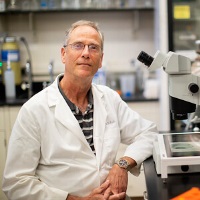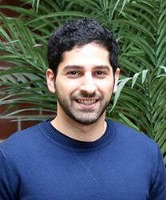Parasitic Helminths:
Genetic Determinants of Development and Host Interactions
SPEAKERS
 Dr. Paul J. Brindley is Professor of Microbiology at the Department of Microbiology, Immunology & Tropical Medicine, and at the Research Center for Neglected Diseases of Poverty, in the School of Medicine & Health Sciences of the George Washington University (GW), Washington DC. He is an alumnus of the University of Queensland, Brisbane, Australia and undertook post-doctoral training at the National Institutes of Health (NIH)’s NIAID Laboratory of Parasitic Diseases, Bethesda, Maryland, in the laboratory of Dr. Alan Sher. He has held faculty level appointments at the Queensland Institute of Medical Research, Brisbane, Australia, University College Dublin, Ireland, and at Tulane University, New Orleans, LA where he was the William Vincent Professor of Tropical Medicine. He was the recipient of the Scholar Award in Molecular Parasitology, Infectious Diseases Research of the Burroughs Wellcome Fund (2001-2006) and is a Fellow of the American Society of Tropical Medicine & Hygiene (2014). In 2019 he was awarded a Doctor of Science degree, honoris causa, by Khon Kaen University, Thailand. Dr. Brindley is co-author of >340 peer-reviewed articles, his current h-index scores are 70 (Google Scholar) and 58 (Scopus). He is co-Editor-in-Chief of PLoS Neglected Tropical Diseases. He is chair of the Institutional Biosafety Committee at GW. Twenty scientists—many of from endemic countries and/or diverse backgrounds—have successfully completed doctoral dissertation degrees, and >10 scientists have undertaken post-doctoral training, in his laboratory. His research focus is neglected tropical diseases, especially functional genomics approaches to investigate helminthic infections, and helminth infection-induced cancers, research sponsored by ongoing awards from the NIH, the Wellcome Trust, and DARPA. He maintains active research collaborations in the US, Thailand, Australia, Portugal, Britain, Ireland, Germany, and France.
Dr. Paul J. Brindley is Professor of Microbiology at the Department of Microbiology, Immunology & Tropical Medicine, and at the Research Center for Neglected Diseases of Poverty, in the School of Medicine & Health Sciences of the George Washington University (GW), Washington DC. He is an alumnus of the University of Queensland, Brisbane, Australia and undertook post-doctoral training at the National Institutes of Health (NIH)’s NIAID Laboratory of Parasitic Diseases, Bethesda, Maryland, in the laboratory of Dr. Alan Sher. He has held faculty level appointments at the Queensland Institute of Medical Research, Brisbane, Australia, University College Dublin, Ireland, and at Tulane University, New Orleans, LA where he was the William Vincent Professor of Tropical Medicine. He was the recipient of the Scholar Award in Molecular Parasitology, Infectious Diseases Research of the Burroughs Wellcome Fund (2001-2006) and is a Fellow of the American Society of Tropical Medicine & Hygiene (2014). In 2019 he was awarded a Doctor of Science degree, honoris causa, by Khon Kaen University, Thailand. Dr. Brindley is co-author of >340 peer-reviewed articles, his current h-index scores are 70 (Google Scholar) and 58 (Scopus). He is co-Editor-in-Chief of PLoS Neglected Tropical Diseases. He is chair of the Institutional Biosafety Committee at GW. Twenty scientists—many of from endemic countries and/or diverse backgrounds—have successfully completed doctoral dissertation degrees, and >10 scientists have undertaken post-doctoral training, in his laboratory. His research focus is neglected tropical diseases, especially functional genomics approaches to investigate helminthic infections, and helminth infection-induced cancers, research sponsored by ongoing awards from the NIH, the Wellcome Trust, and DARPA. He maintains active research collaborations in the US, Thailand, Australia, Portugal, Britain, Ireland, Germany, and France.
 Dr. Elissa Hallem is a professor in the Department of Microbiology, Immunology, and Molecular Genetics at UCLA. Her lab studies the host-seeking and host-invasion behaviors of skin-penetrating nematodes. Dr. Hallem received a BA in biology and chemistry from Williams College in 1999, and a PhD in neuroscience from Yale University in 2005. After completing a postdoctoral fellowship at Caltech, she joined the UCLA faculty in 2011. Dr. Hallem was the recipient of a 2012 MacArthur Fellowship.
Dr. Elissa Hallem is a professor in the Department of Microbiology, Immunology, and Molecular Genetics at UCLA. Her lab studies the host-seeking and host-invasion behaviors of skin-penetrating nematodes. Dr. Hallem received a BA in biology and chemistry from Williams College in 1999, and a PhD in neuroscience from Yale University in 2005. After completing a postdoctoral fellowship at Caltech, she joined the UCLA faculty in 2011. Dr. Hallem was the recipient of a 2012 MacArthur Fellowship.
 Dr. De’Broski R. Herbert is a Professor of Pathobiology in the Department of Pathobiology at the University of Pennsylvania School of Veterinary Medicine, and a Presidential Professor of Immunology at the University of Pennsylvania. Throughout his career, Dr. Herbert has explored the cellular and molecular regulatory networks that control host immunity, inflammation, and tissue repair during parasitic helminth infection. He obtained his PhD from Thomas Jefferson Medical College, where his research demonstrated a critical role for IL-5, B‑1 lymphocytes, and eosinophils in host-protective immunity against Strongyloides stercoralis. He spent several years as a postdoctoral fellow at the University of Cape Town in the laboratory of Frank Brombacher.
Dr. De’Broski R. Herbert is a Professor of Pathobiology in the Department of Pathobiology at the University of Pennsylvania School of Veterinary Medicine, and a Presidential Professor of Immunology at the University of Pennsylvania. Throughout his career, Dr. Herbert has explored the cellular and molecular regulatory networks that control host immunity, inflammation, and tissue repair during parasitic helminth infection. He obtained his PhD from Thomas Jefferson Medical College, where his research demonstrated a critical role for IL-5, B‑1 lymphocytes, and eosinophils in host-protective immunity against Strongyloides stercoralis. He spent several years as a postdoctoral fellow at the University of Cape Town in the laboratory of Frank Brombacher.
Dr. Herbert and his laboratory colleagues investigate mechanisms of host protection against helminths, Type 2 inflammation, and the resolution of chronic mucosal inflammation in several model systems. Through their work on TFF proteins, they have identified a family of orphan receptors in the leucine-rich repeat and Nogo-interacting protein family as putative TFF receptors. Recently, Dr. Herbert has established collaborations with investigators in Brazil, Nigeria, and New Zealand to collect samples from individuals infected with parasitic worms in an effort to correlate his observations in murine models to human patients.
 Dr. Karl F. Hoffmann holds the Aberystwyth University Chair of Parasitology at the Department of Life Sciences, having relocated in 2007 from the Department of Pathology, University of Cambridge. He completed his PhD in 1997 at the Johns Hopkins University School of Medicine in Mette Strand’s laboratory and was one of Tom Wynn’s first PDRAs at the Laboratory of Parasitic Diseases, NIH (1997-2000) before moving to Cambridge on a EMBO long term research fellowship (2000-2002) and Wellcome Career Development Award (2002-2007) where he shared a laboratory with David Dunne.
Dr. Karl F. Hoffmann holds the Aberystwyth University Chair of Parasitology at the Department of Life Sciences, having relocated in 2007 from the Department of Pathology, University of Cambridge. He completed his PhD in 1997 at the Johns Hopkins University School of Medicine in Mette Strand’s laboratory and was one of Tom Wynn’s first PDRAs at the Laboratory of Parasitic Diseases, NIH (1997-2000) before moving to Cambridge on a EMBO long term research fellowship (2000-2002) and Wellcome Career Development Award (2002-2007) where he shared a laboratory with David Dunne.
Since joining the Department of Life Sciences at AU, Dr. Hoffmann has instigated the formation of the Parasitology and Helminth Control Research Group and has recently directed the development of a new interdisciplinary research center, the Barrett Center for Helminth Control (BCHC). He is an editor for Parasitology International, serves on the Welsh Government Life Sciences National Research Network’s Management and Executive Boards and has recently completed a 5-year term on the Wellcome Basic Science Interview Committee.
In mid-2020, Dr. Hoffmann was appointed as the long-term Academic Lead to the VetHub1 Laboratories. VetHub1 is an innovation cluster providing world-class veterinary science and bio-secure facilities, backed by the European Regional Development Fund and working in collaboration with the Growing Mid Wales partnership, the Wales Veterinary Science Centre, and other valued stakeholders. Dr. Hoffmann leads the cluster in securing new investments and alliances towards sustainable business growth and the development of internationally recognized research skills and translational capabilities.
Dr. Hoffmann’s laboratory team works on strategies to control helminths (blood and liver flukes) of biomedical, veterinary, and zoonotic importance. Here, using functional genomics as well as classical molecular and biochemical techniques, his team attempts to provide new insights into developmental biology, epigenetics, bilateral symmetry, immune-evasion, sexual reproduction and organogenesis. His laboratory has been awarded research funding from BBSRC, the European Union, the Welsh Government, Wellcome, the Nuffield Foundation, Innovate UK, Zoetis, and MSD Animal Health. As part of current translational activities, Dr. Hoffmann welcomes the opportunity to engage with other investigators in the search for new anthelmintics effective against both blood (Schistosoma sp) and liver (Fasciola hepatica) flukes.
 Dr. James B. “Sparky” Lok is Emeritus Professor of Parasitology at the University of Pennsylvania School of Veterinary Medicine. He received his PhD in entomology from Cornell University in 1981, and in 1983 he completed his postdoctoral work at the University of Pennsylvania studying filarid nematodes and their insect hosts.
Dr. James B. “Sparky” Lok is Emeritus Professor of Parasitology at the University of Pennsylvania School of Veterinary Medicine. He received his PhD in entomology from Cornell University in 1981, and in 1983 he completed his postdoctoral work at the University of Pennsylvania studying filarid nematodes and their insect hosts.
Dr. Lok’s primary research focuses on the factors affecting the development and lifespan of parasitic nematodes. Dr. Lok and his team work specifically with the intestinal threadworm, or Strongyloides stercoralis, to understand what regulates the worm’s development as it infects a host body.
In 2018, Dr. Lok was named the Bueding and von Brand Lecturer by the American Society of Parasitologists, and in 2014 he received the Association of American Veterinary Medicine College’s Zoetis Distinguished Teacher Award.
 Dr. David J. Mangelsdorf is Professor and Chair of the Department of Pharmacology at the University of Texas Southwestern Medical Center in Dallas and an Investigator of the Howard Hughes Medical Institute. Dr. Mangelsdorf holds the Alfred G. Gilman Distinguished Chair in Pharmacology and the Raymond and Ellen Willie Distinguished Chair in Molecular Neuropharmacology. Dr. Mangelsdorf received his BS in Biology and Chemistry from Northern Arizona University in Flagstaff in 1981. He received his PhD in Biochemistry from the University of Arizona in Tucson in 1987. He received his postdoctoral training at The Salk Institute for Biological Studies before starting his career at UT Southwestern in Dallas in 1993.
Dr. David J. Mangelsdorf is Professor and Chair of the Department of Pharmacology at the University of Texas Southwestern Medical Center in Dallas and an Investigator of the Howard Hughes Medical Institute. Dr. Mangelsdorf holds the Alfred G. Gilman Distinguished Chair in Pharmacology and the Raymond and Ellen Willie Distinguished Chair in Molecular Neuropharmacology. Dr. Mangelsdorf received his BS in Biology and Chemistry from Northern Arizona University in Flagstaff in 1981. He received his PhD in Biochemistry from the University of Arizona in Tucson in 1987. He received his postdoctoral training at The Salk Institute for Biological Studies before starting his career at UT Southwestern in Dallas in 1993.
Dr. Mangelsdorf runs a joint laboratory with his long-time collaborator, Dr. Steven Kliewer. Their research focuses on understanding the molecular and physiologic components of signaling pathways that control metabolism. Their lab has discovered several therapeutic targets that are being developed to treat diverse diseases such as cholestasis, fatty liver disease, pancreatitis, alcoholism, and nematode parasitism.
He has received several international awards for his work including the John J. Abel Award in Pharmacology and the Endocrine Society’s Gerald D. Aurbach Award here in the United States; the Adolf Windaus Prize and the Heinrich-Wieland-Prize in Germany for his work on cholesterol metabolism, and the Rolf Luft Award in Endocrinology and Diabetes from the Karolinska Institute in Stockholm, Sweden. He received an honorary doctorate degree from the University Blaise-Pascual in France, and he is a member of the National Academy of Sciences and The Academy of Medicine, Engineering and Science of Texas.
 Dr. Meera Nair is an Associate Professor at the University of California Riverside School of Medicine, where her lab researches the immune response to helminth parasites. Dr. Nair’s fascination for “all things helminths” began in her early years of training at the University of Edinburgh, Scotland, where she completed her PhD on macrophage function in filarial nematode infection. Dr. Nair then pursued her postdoctoral training at the University of Pennsylvania where she discovered the important contribution of a new family of secreted proteins – the Resistin-like molecules (RELM) – in balancing the protective vs pathogenic effects of the immune response to lung helminths.
Dr. Meera Nair is an Associate Professor at the University of California Riverside School of Medicine, where her lab researches the immune response to helminth parasites. Dr. Nair’s fascination for “all things helminths” began in her early years of training at the University of Edinburgh, Scotland, where she completed her PhD on macrophage function in filarial nematode infection. Dr. Nair then pursued her postdoctoral training at the University of Pennsylvania where she discovered the important contribution of a new family of secreted proteins – the Resistin-like molecules (RELM) – in balancing the protective vs pathogenic effects of the immune response to lung helminths.
At UCR, the Nair lab investigates the immune response to infection and inflammatory diseases using preclinical mouse models and clinical samples. The ultimate goal of the lab is to identify protective or pathogenic immune pathways that can be targeted for diagnostic or therapeutic purposes. Using mouse helminth infection models, the lab investigates macrophages as first responders to infection, with the focus on their gene expression profiles, their interaction with the parasitic worm, and their function in tissue repair.
In addition to Immunology research, Dr. Nair is passionate about teaching postdoctoral scientists, and graduate and medical students: she won the Best Lecturer award in 2018 and 2020, the Outstanding Block Director award in 2019, 2021 and 2022, and teaches the Biology of Parasitism summer course in Woods Hole, Massachusetts.
 Dr. Murray Selkirk obtained his PhD in 1981 at the National Institute for Medical Research, Mill Hill, London, where he studied immunosuppression in murine trypanosomiasis with Bridget Ogilvie. He then joined the University of Washington, Seattle, working with Nina Agabian on antigenic variation in trypanosomes, and after a brief spell at the Naval Biosciences Laboratory in Oakland, joined Rick Maizels at Imperial College London to work on nematode parasites. He was appointed to a Lectureship in the Department of Biochemistry in 1986, Professor of Biochemical Parasitology in 2001, and was Head of the Division of Cell & Molecular Biology and Department of Life Sciences at Imperial College from 2005-2008 and 2011-2017 respectively. His later work aimed primarily to understand how nematode parasites effect long-term survival in mammalian hosts, with a particular focus on molecular mechanisms underlying regulation of the host immune system.
Dr. Murray Selkirk obtained his PhD in 1981 at the National Institute for Medical Research, Mill Hill, London, where he studied immunosuppression in murine trypanosomiasis with Bridget Ogilvie. He then joined the University of Washington, Seattle, working with Nina Agabian on antigenic variation in trypanosomes, and after a brief spell at the Naval Biosciences Laboratory in Oakland, joined Rick Maizels at Imperial College London to work on nematode parasites. He was appointed to a Lectureship in the Department of Biochemistry in 1986, Professor of Biochemical Parasitology in 2001, and was Head of the Division of Cell & Molecular Biology and Department of Life Sciences at Imperial College from 2005-2008 and 2011-2017 respectively. His later work aimed primarily to understand how nematode parasites effect long-term survival in mammalian hosts, with a particular focus on molecular mechanisms underlying regulation of the host immune system.
 Dr. Mostafa Zamanian is an Assistant Professor in the Department of Pathobiological Sciences at the University of Wisconsin-Madison. The goal of his research is to identify new targets and strategies for helminth control and to connect this effort to a better understanding of basic parasite receptor biology and the molecular interactions that occur between helminths and their vertebrate hosts and vectors. Dr. Zamanian received his PhD in Neuroscience at Iowa State, and trained as a postdoctoral fellow at McGill University and Northwestern University.
Dr. Mostafa Zamanian is an Assistant Professor in the Department of Pathobiological Sciences at the University of Wisconsin-Madison. The goal of his research is to identify new targets and strategies for helminth control and to connect this effort to a better understanding of basic parasite receptor biology and the molecular interactions that occur between helminths and their vertebrate hosts and vectors. Dr. Zamanian received his PhD in Neuroscience at Iowa State, and trained as a postdoctoral fellow at McGill University and Northwestern University.